Photos show the biggest moments of the 2024 Paris Olympics
Talia Lakritz

- The 2024 Paris Olympics were held from July 26 to August 11.
- Getty Images photographers captured memorable moments across competitions.
The 2024 Paris Olympics concluded on August 11 after 19 days of sporting events.
Athletes from 206 territories competed in a range of disciplines, resulting in come-from-behind victories, viral moments, and world records.
In an email to Business Insider, Getty Images photographers shared the stories behind some of the iconic photos they took at the Paris Olympics.
Here are some of the biggest moments from the 2024 Olympic Games, narrated by the photographers who captured them.
On the first day of the Olympics, Michael Reaves photographed Peter Spens, an artist commissioned to paint volleyball matches.
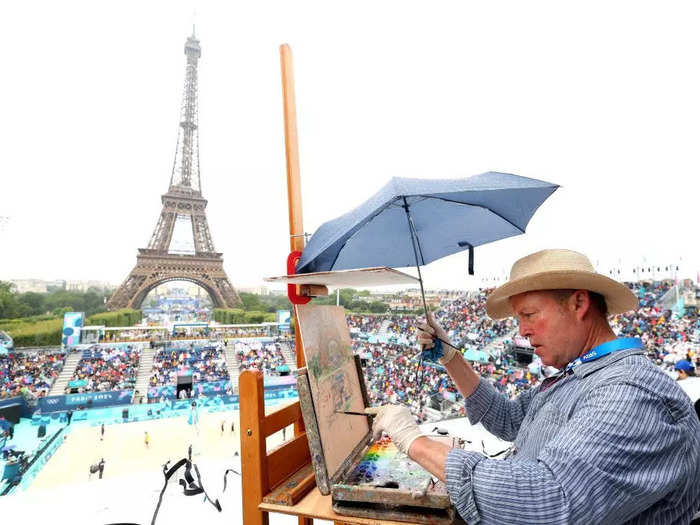
"Coming into the Games, I was looking forward to shooting at this venue as the renderings looked incredible from the court positioned at the base of the famed Eiffel Tower," Reaves said.
Up in the stands, Reaves encountered Spens, an artist commissioned by the International Volleyball Federation to paint original works during the competition.
Reaves said he "thought it provided a very 'French' scene."
Robert Cianflone photographed the US women's soccer team celebrating after winning gold against Brazil.
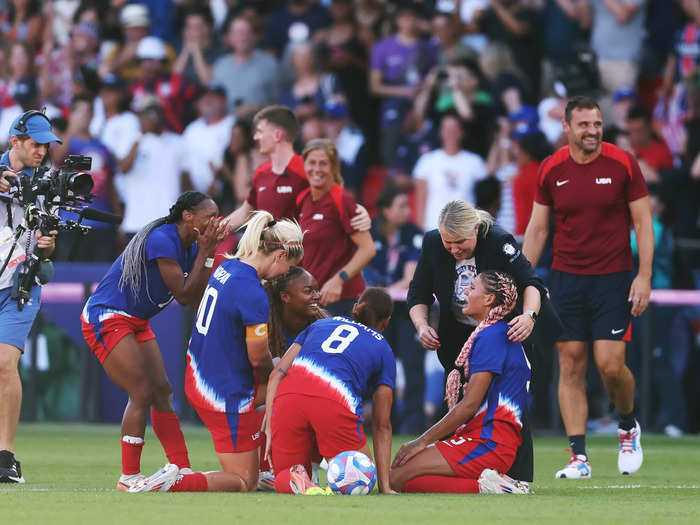
"Team USA was overwhelmed with emotion after a hard-fought game and coming back on top after their performance last Olympics and World Cup last year," Cianflone said. "It's a new era for women's soccer in the US, and it was special to see and capture how much this meant to all of them!"
Patrick Smith found an angle above the field to photograph the first round of the women's 100-meter race "with the light just perfect," he said.
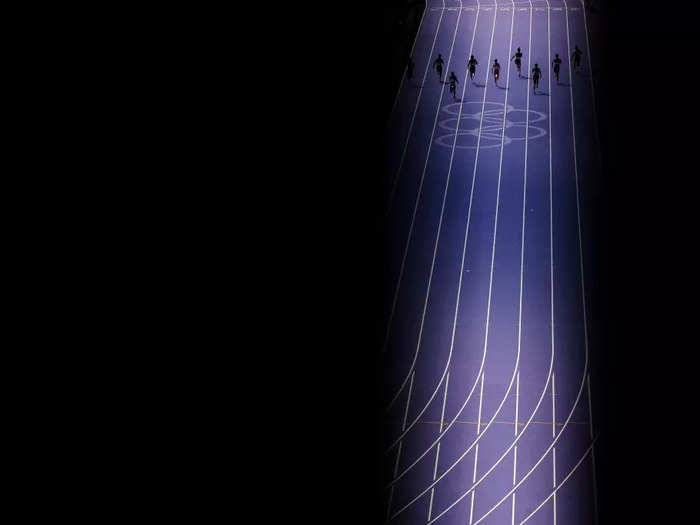
"One of the most challenging things to do as a sports photographer is to find an image no one else has," Smith said. "Often confined by limitations on movements, finding a unique image is the gold standard."
Jamie Squire's photo from the women's team gymnastics final shows Jordan Chiles competing on the balance beam.
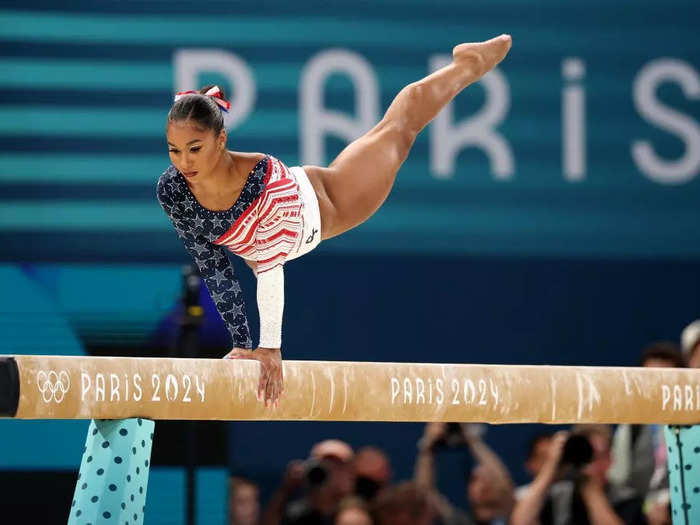
The US women's gymnastics team won gold in the all-around final.
"Gymnastics photos can be graceful, powerful, athletic, and artistic all in the same frame," Squire said. "Here we see Jordan Chiles competing during the team final, and she embodies so much strength and elegance. The Paris 2024 branding and colors really bring the photo together."
Tim de Waele positioned himself perfectly to photograph the women's road race passing by the Louvre.
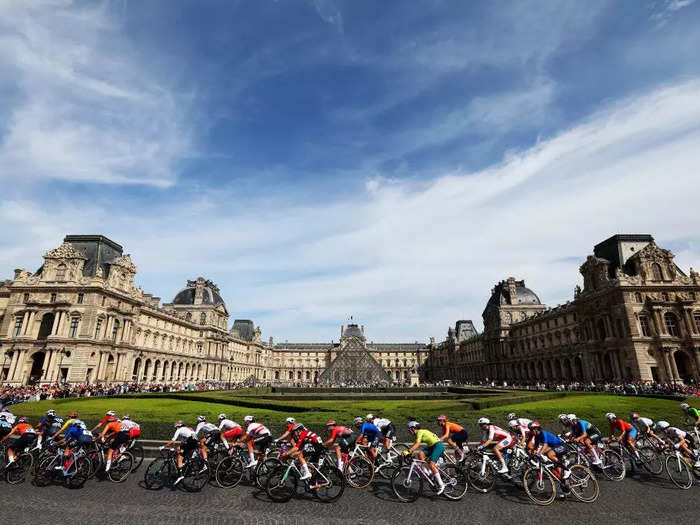
"It's not every day we get to see such a clean image without anything else around, especially in summer when this area is normally overwhelmed by tourists," de Waele said.
Cameron Spencer captured an impressive maneuver during a women's rugby match.
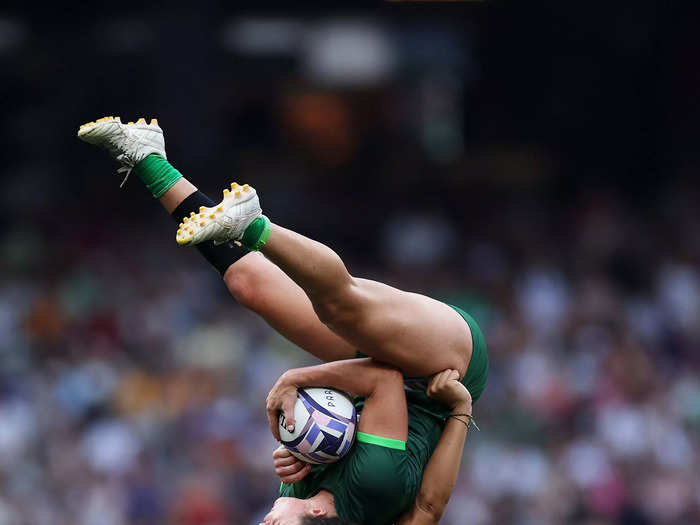
"In this image, Emily Lane of Ireland is being lifted by her teammate to catch the ball off a kickoff, with the aim to get to the ball before the opposition can, so height plays a massive advantage," Spencer said.
"I shoot a lot of rugby and have covered plenty of sevens rugby over the years, too. However, I have never seen a player actually flip upside down completely while being raised in the air. It makes a unique, powerful, and graceful image of a rare moment in rugby."
Al Bello spent two days getting the lighting just right to photograph men's fencing at the Grand Palais.
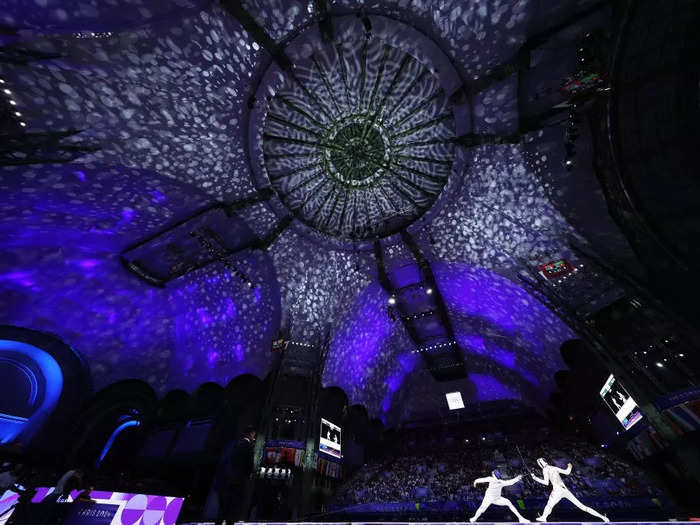
"There are many things that did not line up at first," Bello said. "The light was not right, the judges kept walking in the way, I could not get to the position I wanted, and I also needed to have the fencers compete on center stage, which does not happen until the finals at the night session. Then, for a very short time span, all the elements lined up."
Smith took this photo of Tara Davis-Woodhall in the women's long-jump final with a remote camera set up by the sand pit.
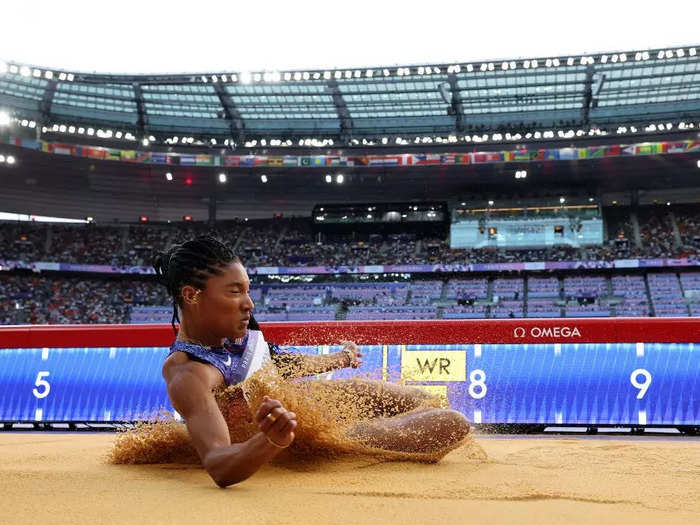
"You can see the direct impact of hitting the sand and how much power she exudes in this world-record-breaking moment," Smith said.
Davis-Woodhall won the gold medal with a jump of 7.1 meters, or over 23 feet.
Steph Chambers waited until the Olympic logo was visible on a table-tennis ball to photograph the North Korean player Kum Yong Kim.
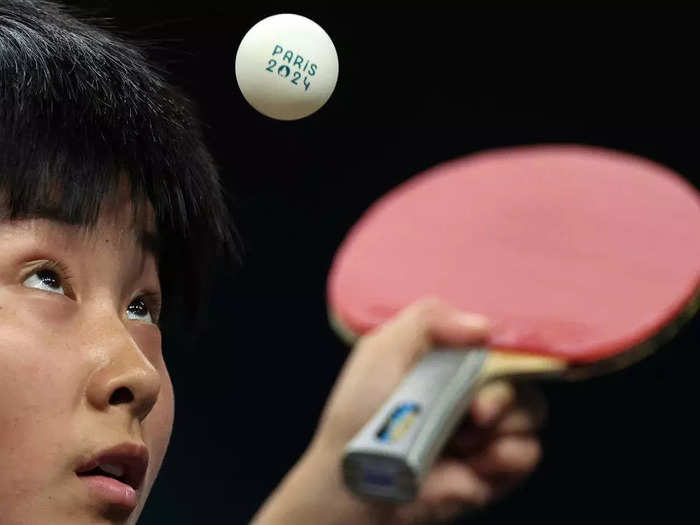
"Oftentimes I don't get lucky," Chambers said, "but when I do it's quite rewarding."
It took a team of photographers to capture the Turkish volleyball player Eda Erdem from above.
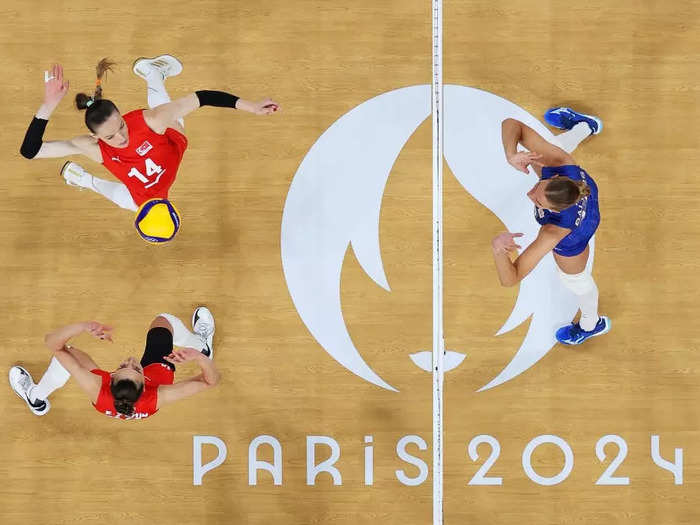
"Much like indoor volleyball, our work at Getty Images is absolutely a team job," Christian Petersen said. "This image was captured by a remote camera set up over the court by staff photographer Richard Heathcote. During the match I was using a remote trigger to capture the action, and editors picked it out and made a fantastic crop.
"I love the simplicity of this as the setter puts the ball in a perfect spot for Eda Erdem to open up and hit it," Petersen said. "It's clean, well-balanced, colorful, and as a team, we nailed it."
Getty Images photographers projected photos on buildings throughout Paris during the Olympics, including one of the American track star Noah Lyles winning gold.
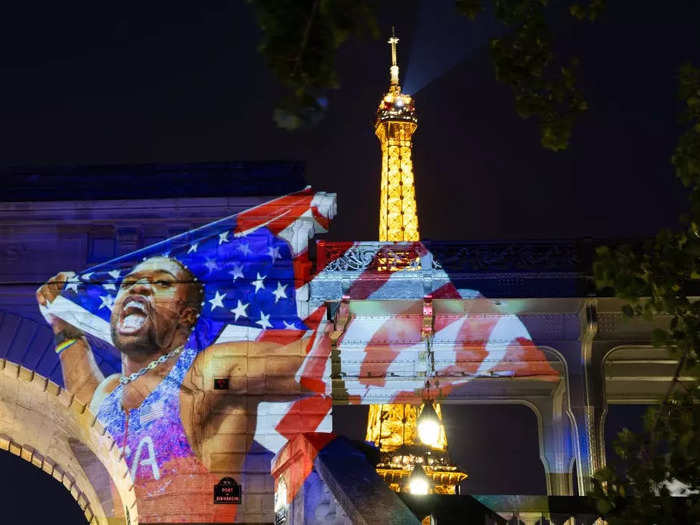
"Throughout the Paris Games, we have been working on a creative project called Parisienne Projections," the photographer Ryan Pierse said. "Each night we'd find a new location to project an iconic Olympic moment and bring it to the streets and buildings of Paris for people to enjoy. This one was taken following the men's 100-meter final, where Noah Lyles of Team USA celebrates his epic win with big emotion and an American flag draped over him."
Another Parisienne Projections display showed Simone Biles competing on the uneven bars.
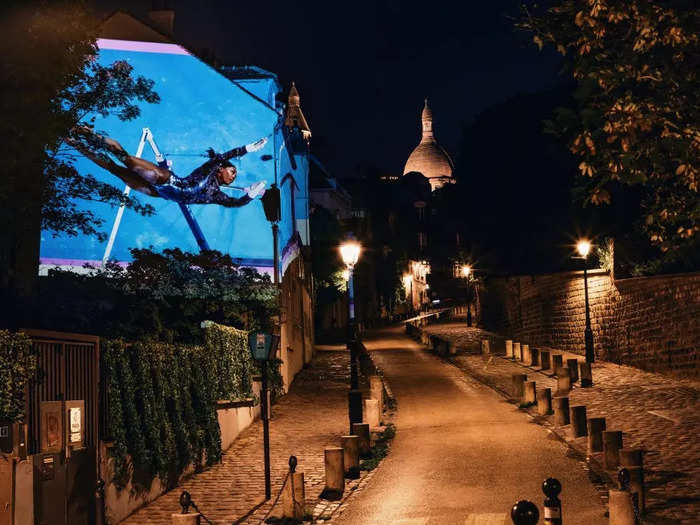
"The host city of the Games is such a pivotal part of the event, and each night a team of us has been going out into the streets to project photos throughout the city for people to see the Games through a unique lens," Carmen Mandato said.
In this composite image, part of a series titled "Layers of the Games," Hector Vivas layered key moments from a men's soccer match between Paraguay and Mali.
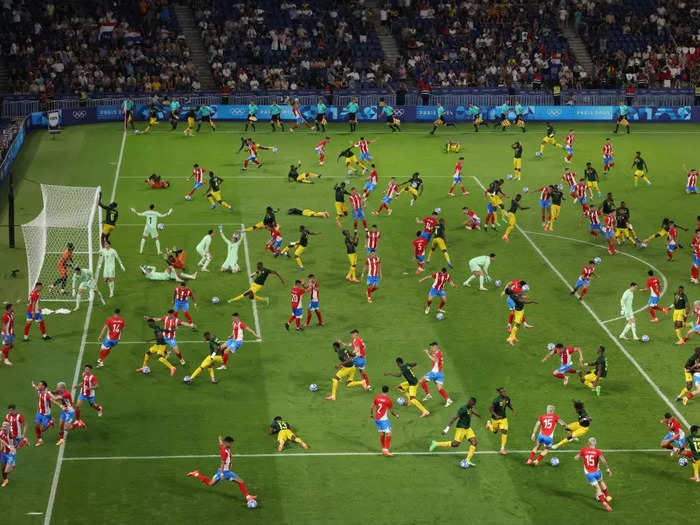
"With 'Layers of the Games,' what I do is put a fixed camera shooting at the most important moments of a game or a day of competition, and then in postproduction I place the layers of the photos on top of each other until I achieve this effect," Vivas said. "It shows the action, emotion, and movement through one half of the field."
Alex Pantling captured Argentina's Agustin Mazzilli and Australia's Eddie Ockenden battling for the ball during a men's field-hockey match.
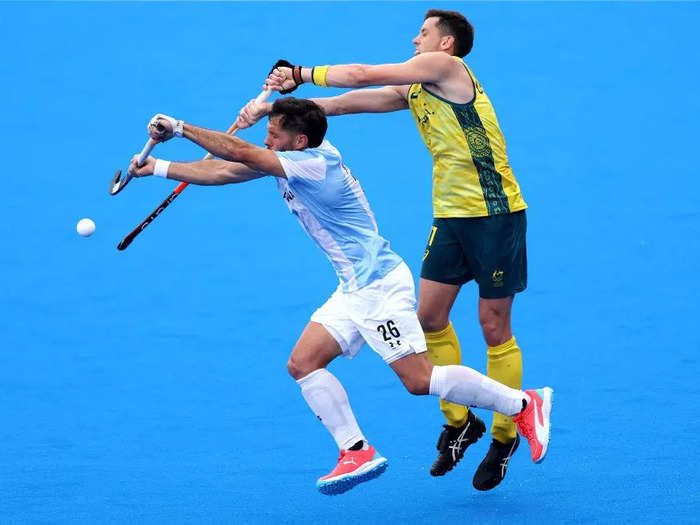
Australia won the match 1-0.
"Hockey can be a very abstract sport, and the athletes constantly seem to make interesting shapes with their bodies and sticks," Pantling said. "I find shooting the sport from an elevated position increases your chances of getting an interesting picture. That was proven here in the men's match between Australia and Argentina as the two players stretched to control the ball and win possession for their team."
This image of the US equestrian Elisabeth Halliday competing at the Palace of Versailles embodies everything the photographer Buda Mendes loves about the Olympics.
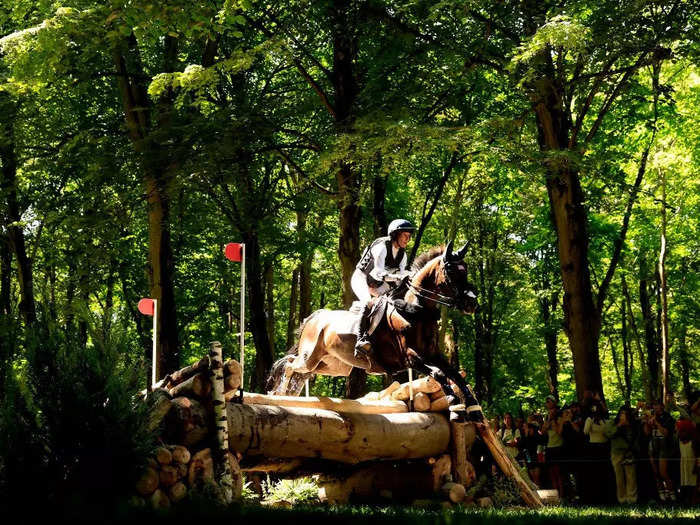
"What I tried most on this day was to find a balance between this amazing sport, the beauty of the course, and the photographic technique looking for the best light," Mendes said. "This photo embodies all three."
Justin Setterfield photographed kayak cross, a new Olympic event where kayakers race four at a time.
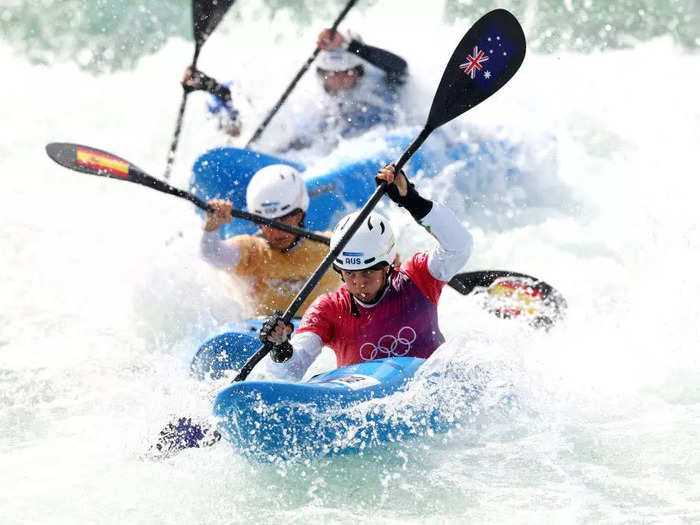
"It was a challenge to find a position where you could get all athletes in one image, as they split up quickly," Setterfield said.
The photographer Elsa had a feeling that Biles and Chiles would do something special during the floor-exercise medal ceremony where the Brazilian gymnast Rebeca Andrade won gold.
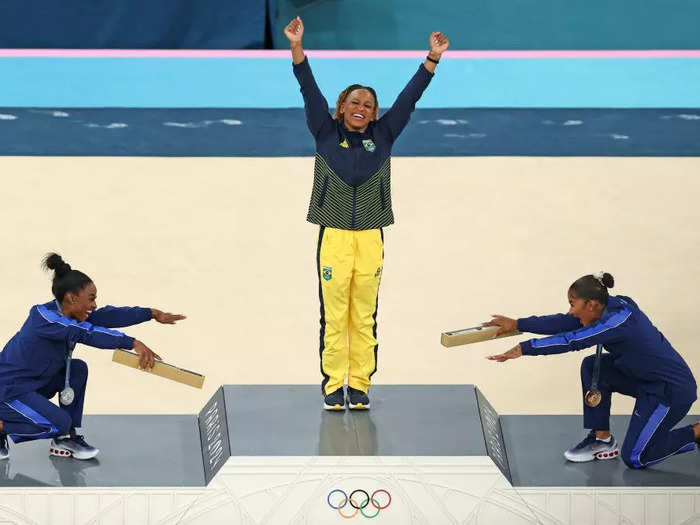
"What I love about his image is it shows what the Olympics and especially gymnastics are all about — athletes supporting one another," Elsa said. "To me, this image embodies the Olympic spirit perfectly."
Spencer said this shot of Lyles crossing the finish line to win the gold medal was "premeditated."
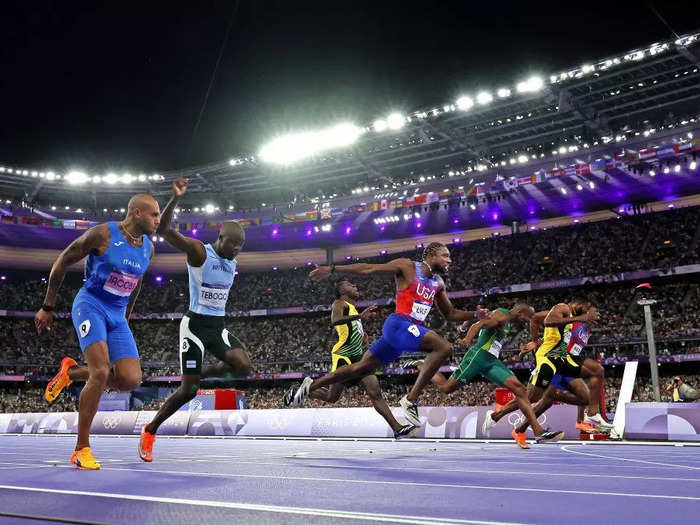
"The camera was focused just after the finish line, hoping Lyles would win and celebrate," Spencer said. "What unfolded was the closest 100-meter final in Olympics history with Lyles winning in 0.005 of a second."
Ezra Shaw found that it was worth arriving early to photograph Olympic events with this image of the French skateboarder Emilie Alexandre.
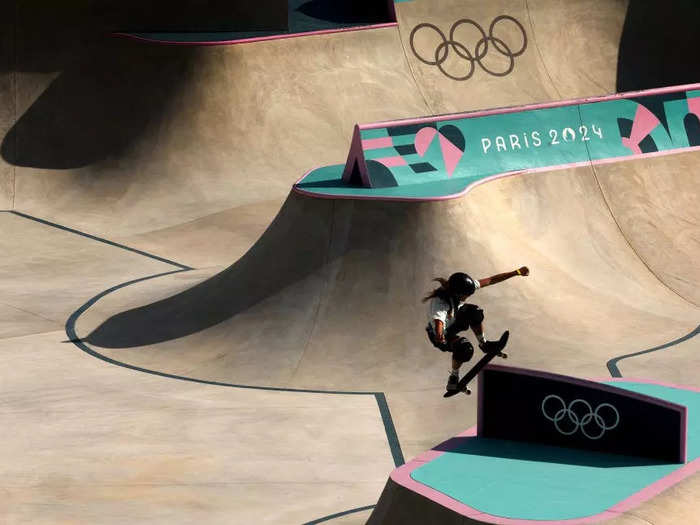
"I wanted to scout the park for the best photo positions, but also wanted to take advantage of the morning sun and shadows on the park for any possible images," Shaw said. "By the time the event started, all the shadows on the park were completely gone and this picture of Emilie Alexandre of Team France would not have been possible."
Rob Carr used a robotic camera above the men's wrestling ring to capture Mohammadhadi Saravi of Iran's ecstatic backflips upon winning gold.
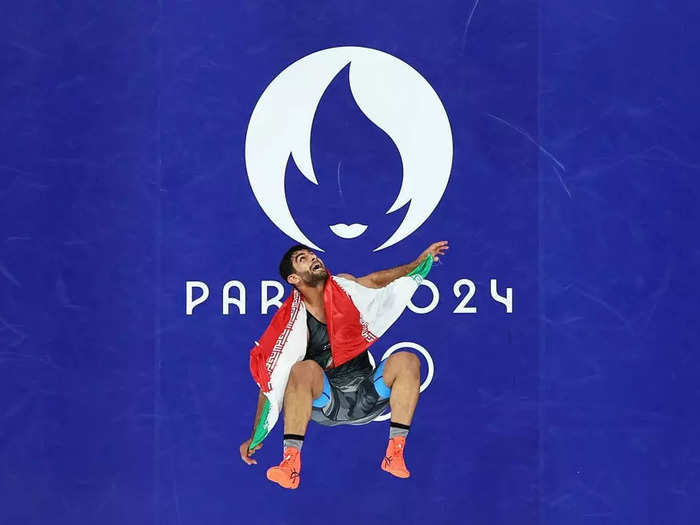
"After Saravi won, he circled the mat celebrating, and I positioned the camera directly over the field of play hoping he would celebrate over the Olympic logo," Carr said. "He started doing flips on the mat from the far left and came to the center, where he performed one more to punctate his win in the dead center."
Sometimes Olympic photographers capture devastating moments, like Michelle Jenneke's fall in the women's 100-meter hurdles.
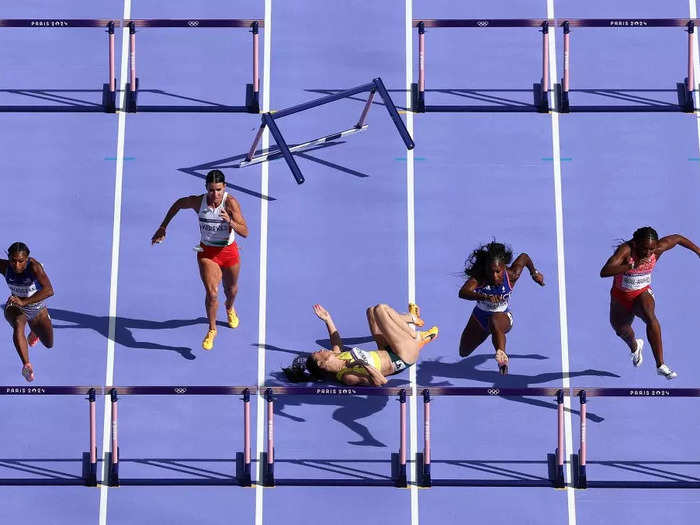
"The Australian Michelle Jenneke clipped one hurdle then crashed into the next before getting up and finishing," Richard Heathcote said. "The frame shows the heaviest part of her crash as she tumbles towards the next hurdle with the other athletes around her trying to avoid being taken out as well."
Lars Baron spent long days sitting on the floor to get the best angles while photographing men's handball.
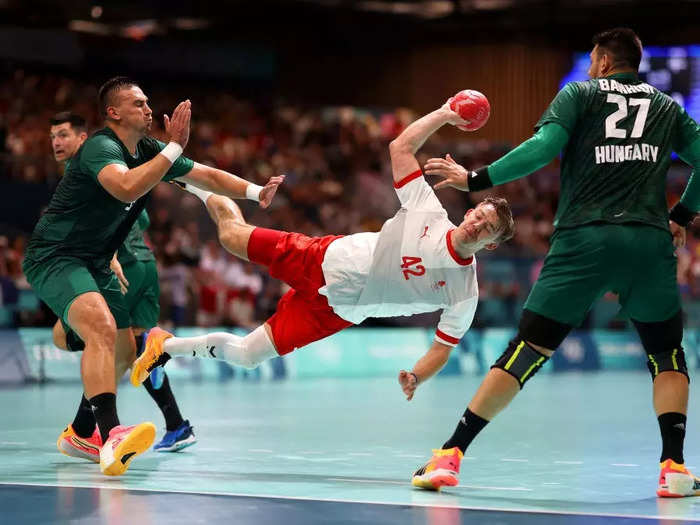
"Handball is one of my favorite sports," Baron said. "I love the speed and the tough action during competition."
David Ramos described the men's road race as "one of the best days of cycling I have ever covered."
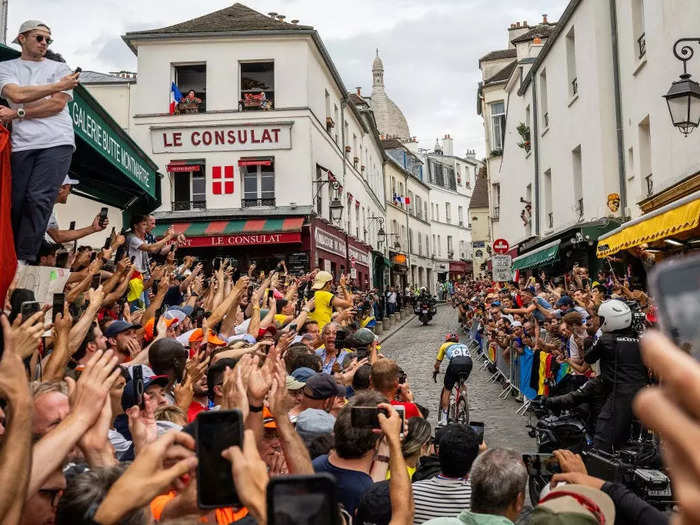
"The atmosphere in the streets of Montmartre was simply spectacular," Ramos said. "My task that day was to find a spot in Montmartre, outside of the photographers' assigned positions, that summed up the environment of this area of Paris — narrow streets, small shops and cafés."
Realizing he needed more height to capture the perfect shot, Ramos bought a ladder and sat on it for six hours until the runners arrived.
"The street got more and more crowded, and I ended up surrounded by hundreds of fans singing and drinking!" he said.
Alex Broadway photographed racers in the BMX racing semifinals as the competition began.
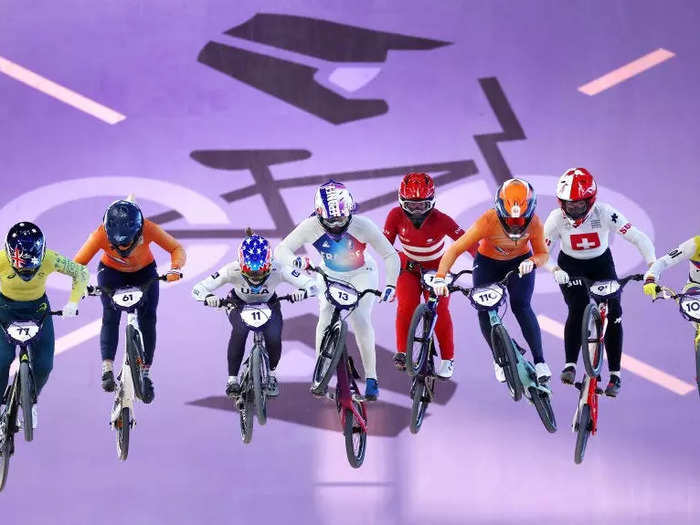
"I really liked the BMX graphic on the start ramp, so I wanted to get a frame with all the riders in the air on the first jump and the graphic in the background," Broadway said.
Chambers photographed the US runner Gabrielle Thomas realizing she won gold in the women's 200-meter final.
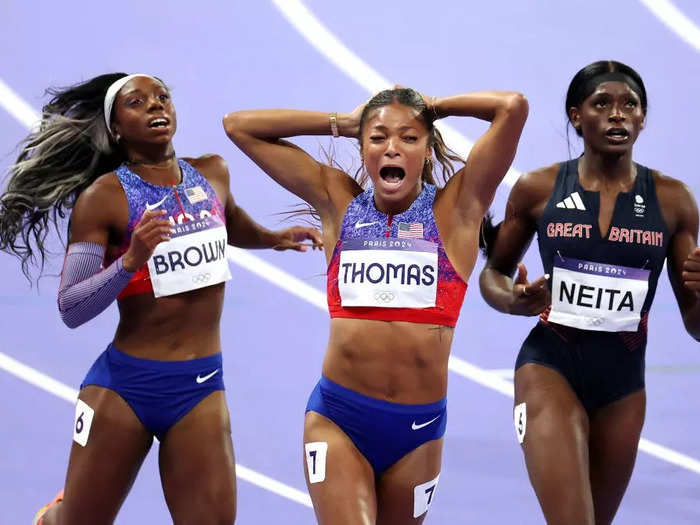
"Gabby Thomas of Team USA was filled with emotion after crossing the finish line to win gold during the women's 200-meter final," Chambers said. "She settled for bronze at the Tokyo 2020 Olympics, so you could see how much this meant to her and how special it was to be an Olympic champion."
Richard Pelham said he couldn't have asked for a more "perfectly timed punch" at an Olympic boxing match.
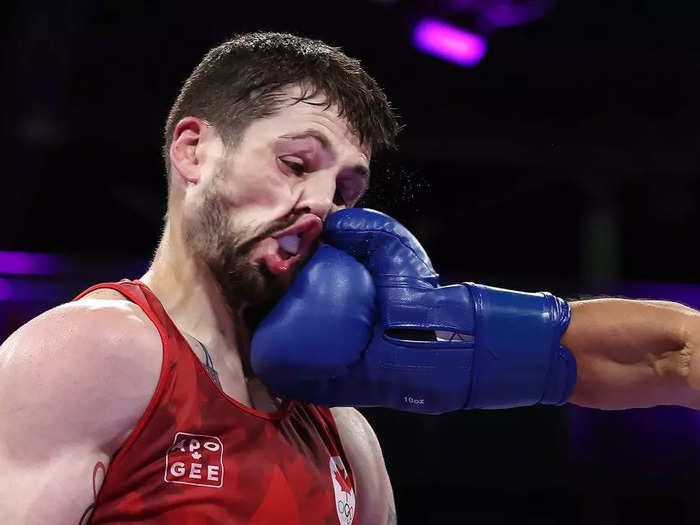
"As a photographer, you cover the action in that three-minute round, capturing the boxers trading blows," Pelham said. "In that split second, the biggest punch connects, and from experience, you know you have a special image."
"Poise, beauty, intensity, and resolve are perfect adjectives to describe this legend," Petersen said of photographing Biles.
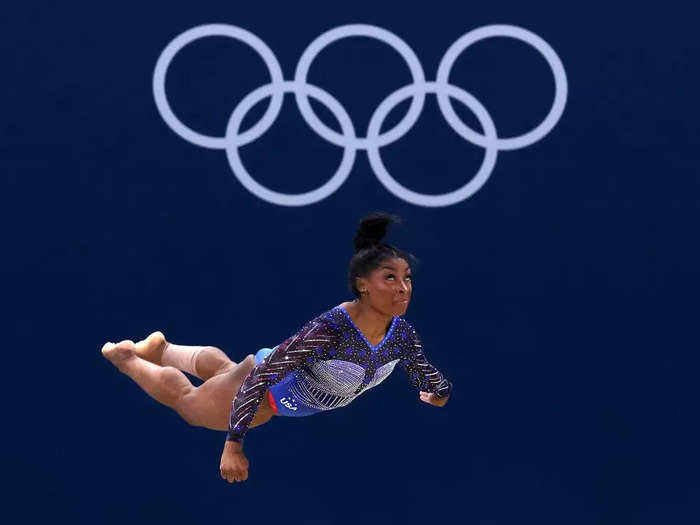
Petersen took this photo of Biles during the individual all-around competition, which she won.
"In her final routine, she soared around the floor and eventually just past the rings on the wall," Petersen said. "I was able to capture her at the peak of a jump from an elevated position with a long lens. Ultimately, I am very happy with the image and forever grateful for the experience."
For the women's individual triathlon, Michael Steele photographed the start, transition, and finish area around the Pont Alexandre III.
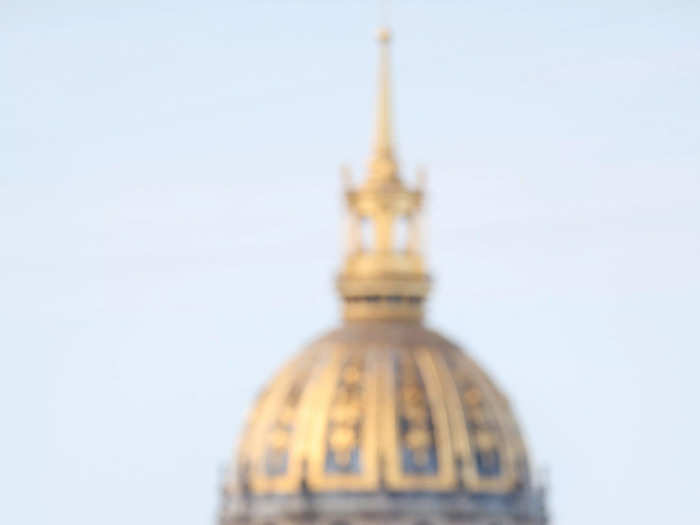
"Squeezed into a narrow position up against a metal railing, I managed to capture the long line of cyclists set against the Place des Invalides, which made the image even more picturesque," Steele said.
Maddie Meyer captured Léon Marchand of France's gold-medal finish in the men's 200-meter breaststroke.
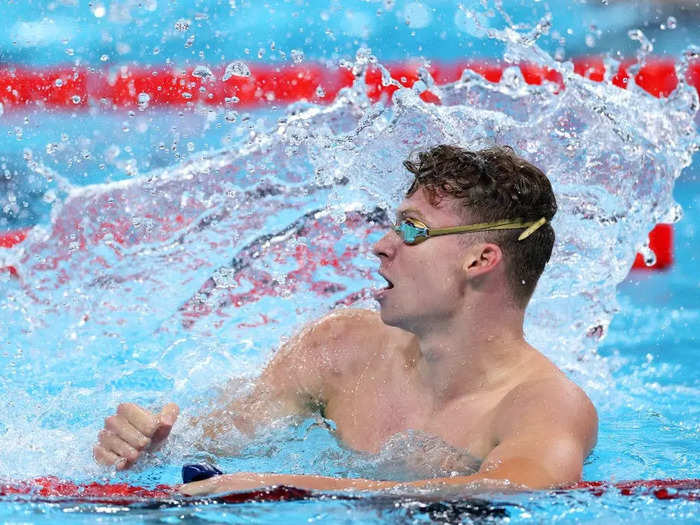
"Marchand had a significant lead, so I stayed focused on him as he finished the race," Meyer said. "He turned towards the crowd and the clock, slamming his arm into the water, creating a graphic splash behind him. This image stood out to me because often the water will cover the swimmer's face, but I love the way it acts as a background emphasizing his celebration."
Carr used a robotic camera above a judo match to capture the South Korean competitor's disappointment with the result.
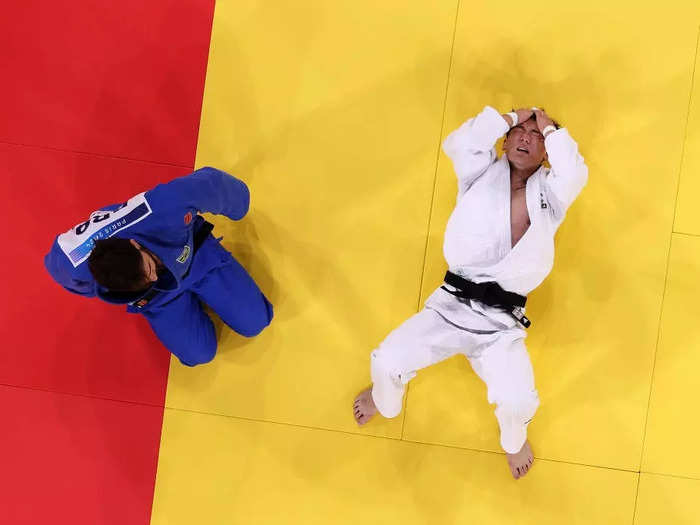
"I was able to follow the two athletes on the robotic camera as the match ended and zoomed in to 50 mm to fill the frame showing the emotion of the contest," Carr said. "The contrasting colors of the floor and their uniforms also make the image striking."
Dan Mullan said this photo of Andrade on the vault was one of his favorite images from the Paris Olympics.
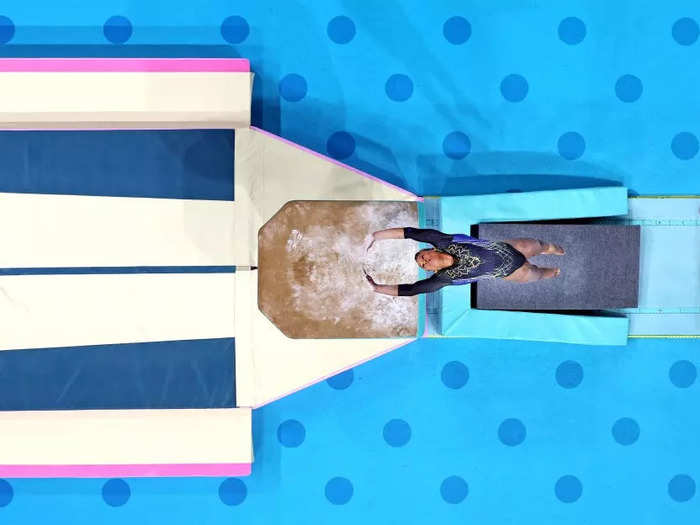
"I was waiting for an athlete to perform this type of vault, as you get to see their face pointing towards the camera," Mullan said.
Mullan added that Andrade looked "controlled, powerful, and poised" during her vault.
Phil Walter timed his photo perfectly to capture Australia's women's skiff team riding a wave in the Olympic sailing event.
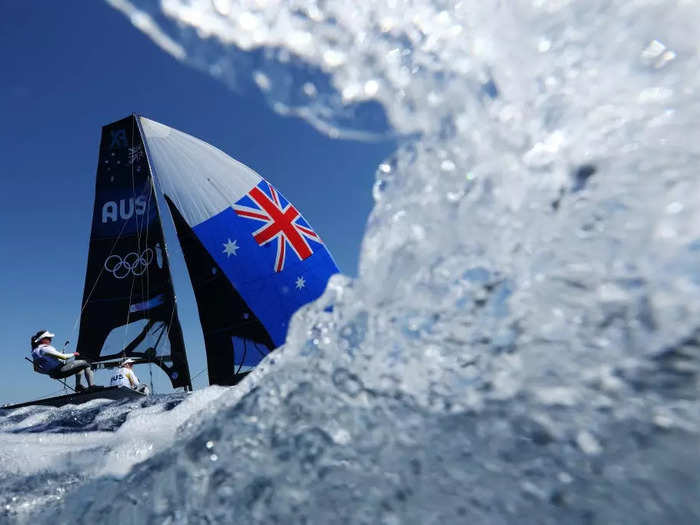
Walter photographed Team Australia during their warm-ups.
"This photo works well due to the splash of the wave curving around the sail of the boat while the Australian flag on the sail and the sailors are still visible in the photo," Walter said.
The Australian swimmer Ariarne Titmus defeated the US's Katie Ledecky in the women's 400-meter freestyle, photographed by Adam Pretty.
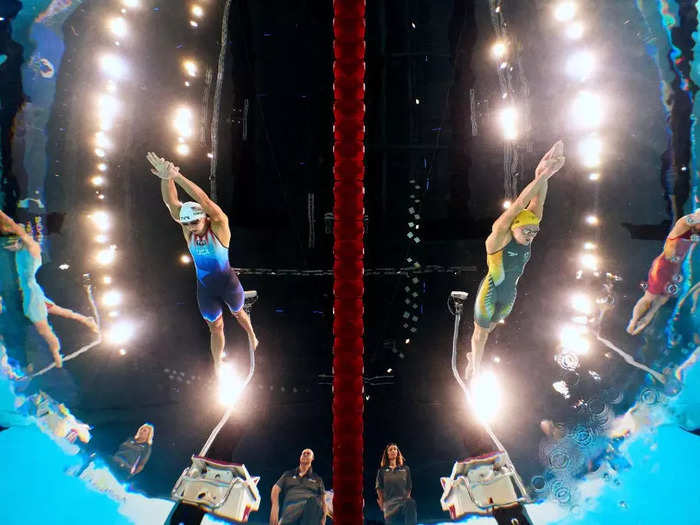
Pretty used an underwater robotic camera to capture the race's start and finish.
"This was a race I had been looking forward to for a long time — possibly the greatest-ever female swimmer, Ariarne Titmus, up against the Olympic champion Katie Ledecky," Pretty said.
Baron photographed skateboarding, a newer Olympic sport, in Paris.
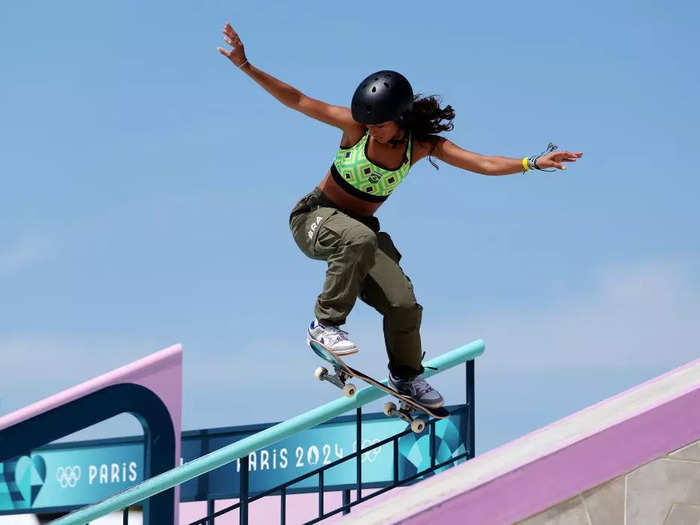
"I enjoy shooting the classic Olympic sports like weightlifting or wrestling, but I also enjoy covering the newer events to the Games like skateboarding," Baron said.
Baron watched the skaters' first runs to determine the best position for photographing the event.
"The sun and blue sky and also the cool attitude and outfit of Brazilian star Rayssa Leal made the picture even better," he said.
Bello captured the joy of victory and the sting of defeat in this image from the men's foil individual final.
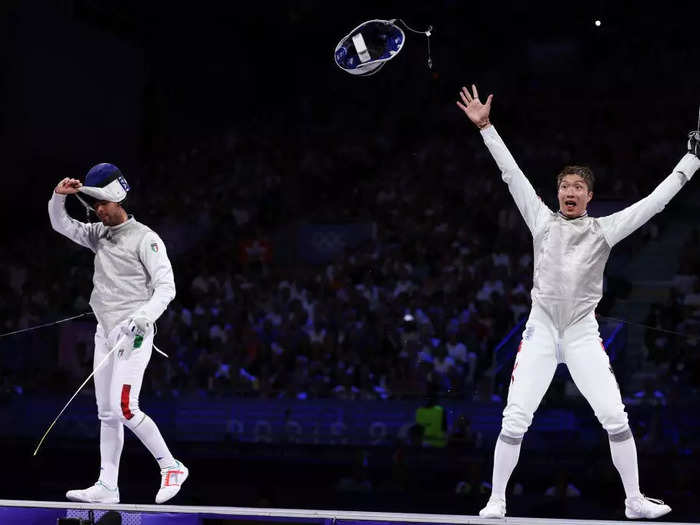
"This was a tightly contested match that was tied 14-14, and with the next point deciding the gold medal, I chose to keep both athletes in the frame," Bello said.
"I knew there was going to be emotion from the winner and loser of this match. My hunch was luckily correct, as the winner threw his helmet in the air and raised his arms in victory while the loser slowly peeled his helmet off his face in defeat."
Another "Layers of the Games" image taken by Vivas shows Eiffel Tower Stadium at sunset.
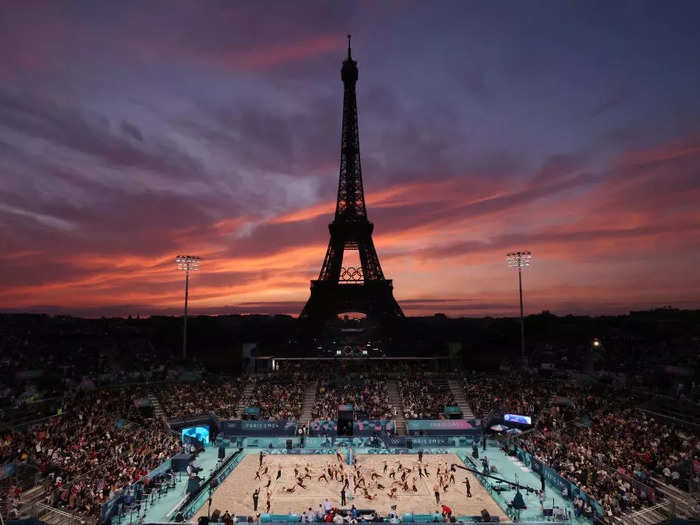
"In our minds, we had visualized a great sunset that day, and the day was cloudy and rainy," Vivas said. "Luckily, in the last moments of the afternoon, the sky cleared and allowed us to do what we already had in our minds."
Quinn Rooney used an underwater robotic camera to photograph divers at the women's synchronized springboard final.
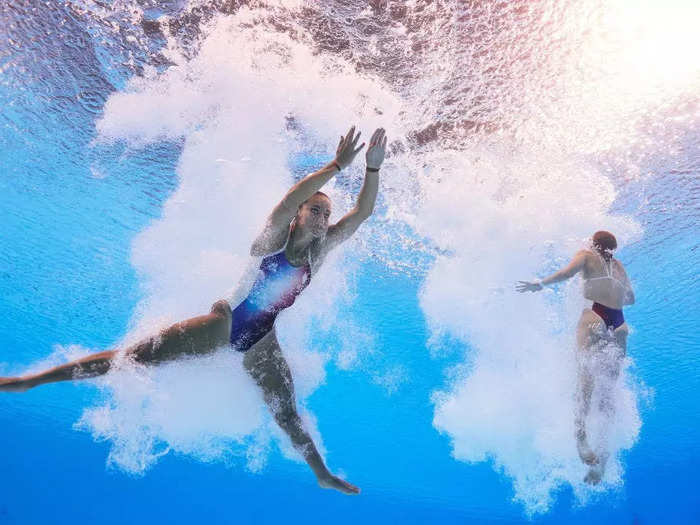
"This angle shows the bubble trail from where the divers entered and the force of their trajectory through the water as they try to slow themselves down and make their bubble entry as small as possible," Rooney said. "I love the shape of the divers in this particular image as they make their way back up to the light."
Jared C. Tilton sought the best angle to photograph the Olympic rings reflected in the Canadian cyclist Nick Wammes' visor.
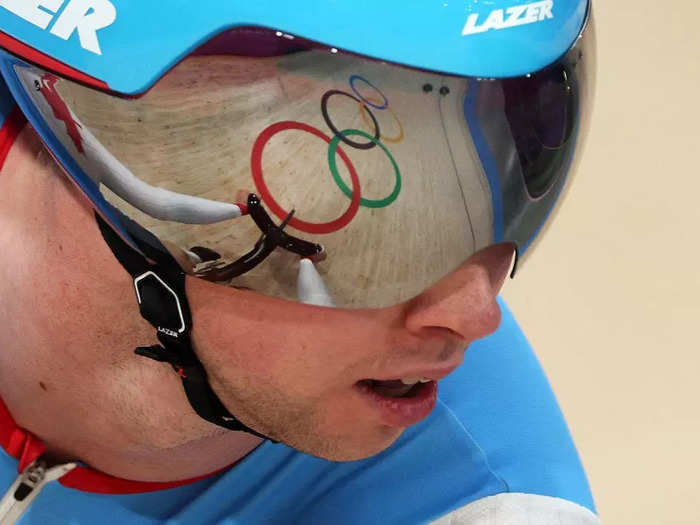
To make this shot possible, Tilton had to sit in an open spectator seat.
"I waited until there was a session that had an available spectator seat from where I needed to be to capture this photo," Tilton said.
Sean M. Haffey called photographing Olympic surfing events in Tahiti "a dream assignment."
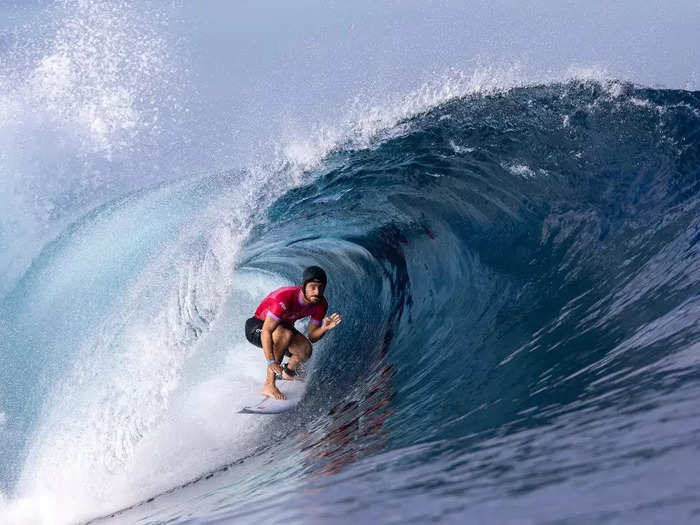
"Surfing in Tahiti lends itself to beautiful photos, but it requires a lot of conditions to come together at the right time," Haffey said. "Weather, wave height, and the athlete's ability all play a major role. In this photo of Kauli Vaast, I was fortunate to have all three."
Squire's photo of Harry Hepworth shows the British gymnast mid-dismount during the men's qualification.
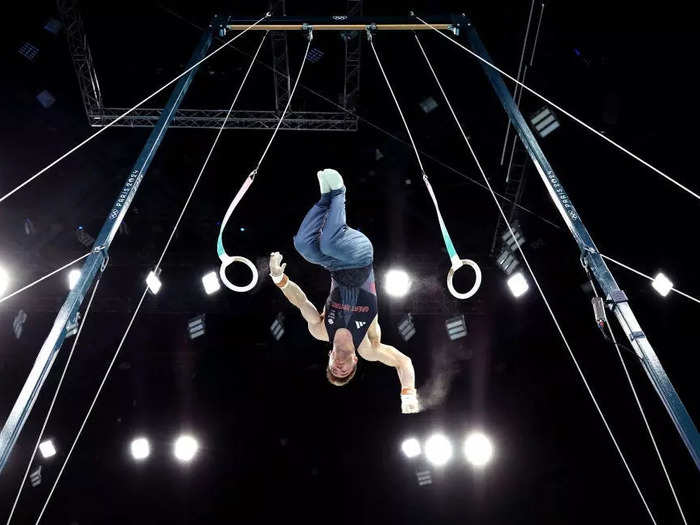
"Traditionally, rings pictures show a tight close-up of the gymnast with flexed muscles as they control their body weight on the apparatus," Squire said. "I decided to shoot wider and from below as I realized I could line up the athletes with the lights and also show how high they are off the ground."
In this photo by Clive Brunskill, the tennis legends Andy Murray and Dan Evans celebrated their win in the first round of men's doubles.
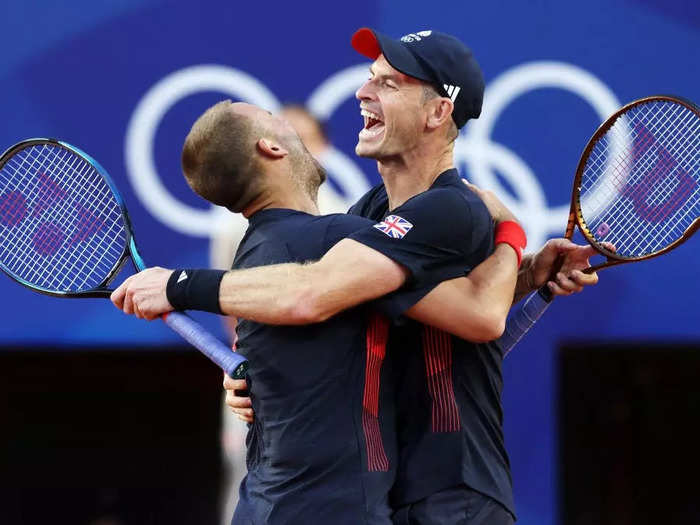
"The celebrations went in the family-box direction, but suddenly he turned and Dan hugged him as he let out a scream of joy," Brunskill said of Murray. "He was in the perfect place for me in front of the Olympic rings! I couldn't believe my luck — the picture was the only one with rings in the background."
Popular Right Now
Popular Keywords
Advertisement